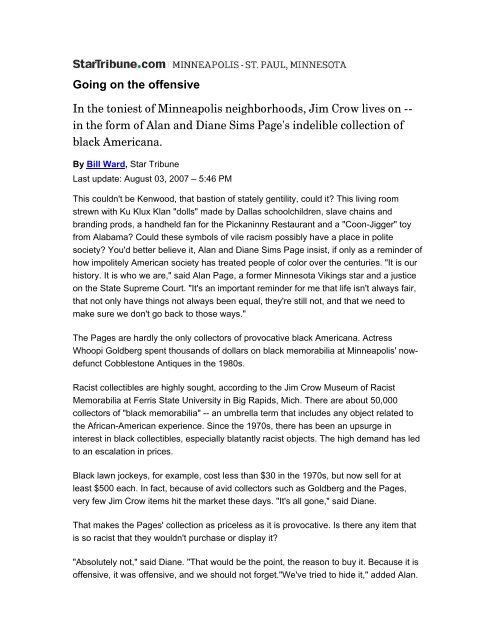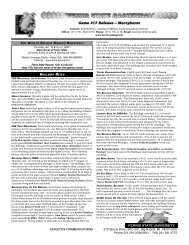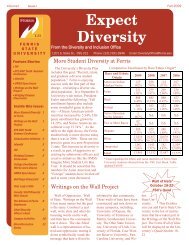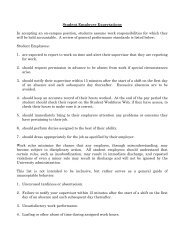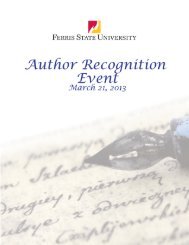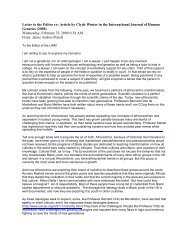Alan and Diane Sims Page - Ferris State University
Alan and Diane Sims Page - Ferris State University
Alan and Diane Sims Page - Ferris State University
You also want an ePaper? Increase the reach of your titles
YUMPU automatically turns print PDFs into web optimized ePapers that Google loves.
Going on the offensive<br />
In the toniest of Minneapolis neighborhoods, Jim Crow lives on --<br />
in the form of <strong>Alan</strong> <strong>and</strong> <strong>Diane</strong> <strong>Sims</strong> <strong>Page</strong>'s indelible collection of<br />
black Americana.<br />
By Bill Ward, Star Tribune<br />
Last update: August 03, 2007 – 5:46 PM<br />
This couldn't be Kenwood, that bastion of stately gentility, could it? This living room<br />
strewn with Ku Klux Klan "dolls" made by Dallas schoolchildren, slave chains <strong>and</strong><br />
br<strong>and</strong>ing prods, a h<strong>and</strong>held fan for the Pickaninny Restaurant <strong>and</strong> a "Coon-Jigger" toy<br />
from Alabama? Could these symbols of vile racism possibly have a place in polite<br />
society? You'd better believe it, <strong>Alan</strong> <strong>and</strong> <strong>Diane</strong> <strong>Sims</strong> <strong>Page</strong> insist, if only as a reminder of<br />
how impolitely American society has treated people of color over the centuries. "It is our<br />
history. It is who we are," said <strong>Alan</strong> <strong>Page</strong>, a former Minnesota Vikings star <strong>and</strong> a justice<br />
on the <strong>State</strong> Supreme Court. "It's an important reminder for me that life isn't always fair,<br />
that not only have things not always been equal, they're still not, <strong>and</strong> that we need to<br />
make sure we don't go back to those ways."<br />
The <strong>Page</strong>s are hardly the only collectors of provocative black Americana. Actress<br />
Whoopi Goldberg spent thous<strong>and</strong>s of dollars on black memorabilia at Minneapolis' nowdefunct<br />
Cobblestone Antiques in the 1980s.<br />
Racist collectibles are highly sought, according to the Jim Crow Museum of Racist<br />
Memorabilia at <strong>Ferris</strong> <strong>State</strong> <strong>University</strong> in Big Rapids, Mich. There are about 50,000<br />
collectors of "black memorabilia" -- an umbrella term that includes any object related to<br />
the African-American experience. Since the 1970s, there has been an upsurge in<br />
interest in black collectibles, especially blatantly racist objects. The high dem<strong>and</strong> has led<br />
to an escalation in prices.<br />
Black lawn jockeys, for example, cost less than $30 in the 1970s, but now sell for at<br />
least $500 each. In fact, because of avid collectors such as Goldberg <strong>and</strong> the <strong>Page</strong>s,<br />
very few Jim Crow items hit the market these days. "It's all gone," said <strong>Diane</strong>.<br />
That makes the <strong>Page</strong>s' collection as priceless as it is provocative. Is there any item that<br />
is so racist that they wouldn't purchase or display it?<br />
"Absolutely not," said <strong>Diane</strong>. "That would be the point, the reason to buy it. Because it is<br />
offensive, it was offensive, <strong>and</strong> we should not forget."We've tried to hide it," added <strong>Alan</strong>.
"When it was happening, we tried to pretend like it wasn't happening. And now that it's<br />
changed, we're trying to pretend it never happened."<br />
<strong>Diane</strong> provided the impetus for amassing the <strong>Page</strong>s' collection of black Americana --<br />
which extends well beyond icons of intolerance to include paintings by Burr Singer,<br />
Harlem Renaissance artifacts <strong>and</strong> other memorabilia.<br />
"It all started when a friend of mine came over to the house, which was very<br />
contemporary. I think we had a couple of Andy Warhols on the wall," <strong>Diane</strong> said. "And<br />
she looked around <strong>and</strong> she said 'You have four children. Where is your African-<br />
American history for your children?' And I said, 'Where does it exist? I don't even know<br />
where to find it.' So that was kind of a wakeup call to me, <strong>and</strong> I started looking for it."<br />
Added <strong>Alan</strong>: "One thing led to the next. It's been mostly <strong>Diane</strong>'s doing. I've just been a<br />
fellow traveler, the beneficiary."<br />
It's not just from the South<br />
The <strong>Page</strong>s are collectors by nature. <strong>Alan</strong> <strong>Page</strong>'s memorabilia from his Hall of Fame<br />
football career -- his close friends call it "the Shrine" -- is in the basement. For years, he<br />
has sought out miniature antique replicas of Smith Miller trucks. A 1906 Buick,<br />
beautifully restored by <strong>Diane</strong>'s father, Irving <strong>Sims</strong>, sits in their garage. They also have<br />
h<strong>and</strong>fuls of items from sundry cultures.<br />
"We have a few pieces that are just African," <strong>Diane</strong> said, "but I don't have the expertise<br />
to know what's tourist stuff <strong>and</strong> what's authentic. I'm Norwegian, so we have some<br />
Norwegian stuff. And I'm 10 percent Native American <strong>and</strong> <strong>Alan</strong> has Native American<br />
blood on both sides of his family, so we have some of that, too."<br />
Still, there's little question that the hunt for black Americana stoked a particularly strong<br />
fire within both of them. The collection started with a book by African-American poet Paul<br />
Laurence Dunbar <strong>and</strong> branched out to include the more controversial material, the<br />
<strong>Page</strong>s said.<br />
They found the KKK dolls at the Minnesota <strong>State</strong> Fair -- "under the counter," <strong>Alan</strong> noted.<br />
They discovered the works of Singer, a Jewish woman who, <strong>Diane</strong> said, "spent the<br />
entire 1930s painting African-Americans because she said that nobody was painting<br />
them realistically. Everything else was stereotypical, caricatures."<br />
One of their favorite Singer oil paintings is called "Only on Thursday."It's of the public<br />
swimming pool in Pasadena, Calif.," <strong>Diane</strong> said. "They cleaned the pool Friday
mornings, so blacks could only swim on Thursday, just before they cleaned it. And that's<br />
in California. It wasn't until 1944 that they finally integrated the pool."<br />
And the more they shopped, at antique fairs <strong>and</strong> in stores wherever they traveled, the<br />
more bigotry-laden material the <strong>Page</strong>s found:<br />
• A toy called "Alligator Bait," with a black child clenched in a gator's jaws; a "Public Sale<br />
of Negroes" notice from 1833 proffering "two likely young Negro wenches ... of genteel<br />
appearance ... <strong>and</strong> well worthy of the notice of a gentleman of fortune;" funeral fans<br />
labeled "strictly white patronage."<br />
• A promotional coin from a New York City real-estate agency reading "white race only";<br />
"The Baby's ABC Book," in which "B is for Ball" <strong>and</strong> "N is for ... " what now actually is<br />
most commonly referred to as "the N-word"; a postcard from 1914 with arrows pointing<br />
at two black men <strong>and</strong> a h<strong>and</strong>written note: "Sambo is scared."<br />
Hanging over the door leading to the <strong>Page</strong>s' garage is a large white fluorescent sign,<br />
originally posted in the Birmingham, Ala., bus station, with big bold black letters<br />
proclaiming "COLORED." Every morning <strong>Alan</strong> <strong>Page</strong> dresses -- suit <strong>and</strong> bow tie on<br />
weekdays, jogging togs on weekends -- <strong>and</strong> walks beneath that sign <strong>and</strong> out into a world<br />
that, he solemnly states, "still has a long, long way to go."<br />
Sign of the times, then <strong>and</strong> now<br />
Many of the <strong>Page</strong>s' items are not overtly racist, but reflect the segregation of the times,<br />
including a Jackie Robinson doll <strong>and</strong> posters for the Georgia <strong>State</strong> Colored Fair in 1914.<br />
The most evocative, at least for the <strong>Page</strong>s, is a plain-looking, h<strong>and</strong>made sign on canvas.<br />
A New Hampshire family made it to wave at a train that was carrying Abraham Lincoln's<br />
casket on a tour through the Northeast in 1865. On one side is inscribed "Uncle Abe, we<br />
will not forget you!" <strong>and</strong> on the other "Our country, shall be one country!"It just breaks<br />
your heart," <strong>Diane</strong> said. "We saw this in Chicago, <strong>and</strong> the dealer was going to take it to a<br />
show in New York. <strong>Alan</strong> was literally choked up when he saw it, <strong>and</strong> when he left the<br />
room, I told the man 'put it on lay-buy. I have to have it for his office.' But he's always<br />
liked having it here in the house, so it never made it to his office.<br />
"What's great about this is, we're still not one country today. So that's our favorite piece."<br />
Added <strong>Alan</strong>, softly: "That has all the hope ... [long pause] it's a reflection of the past <strong>and</strong><br />
the hope of the future."<br />
There's little if any room to augment the collection. By happenstance, that couldn't<br />
happen anyway.
"We don't go to antique stores much anymore. There's nothing there," said <strong>Alan</strong>.<br />
<strong>Diane</strong> agreed, to a point. "You can't find anything, <strong>and</strong> not just African-American<br />
memorabilia, everything you collect. EBay has changed the world, <strong>and</strong> people are<br />
hanging onto things longer. If we started today to try to put together this collection, we<br />
could never do it. If you were lucky enough to find a piece today, you couldn't afford it.<br />
Everything is so expensive."<br />
On the other h<strong>and</strong>, she added, "There's this beautiful old lawn jockey I've had my eye<br />
on. ... "<br />
Bill Ward • 612-673-7643 • bill.ward@startribune.com<br />
© 2007 Star Tribune. All rights reserved.


